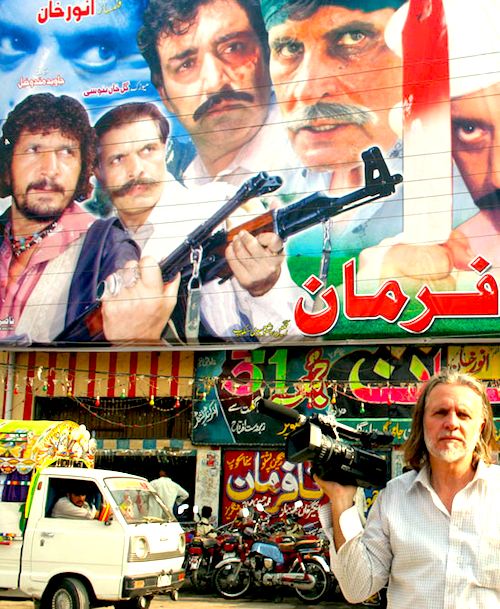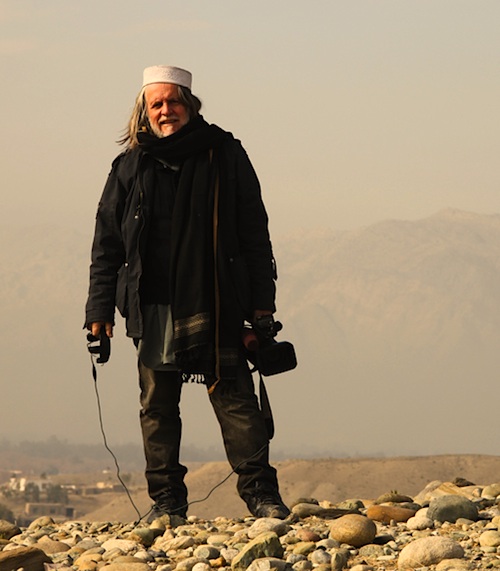
By Joe Bendel. Pashto cinema has an unlikely godfather: an Australian graphic artist and documentary filmmaker, who seems more at home in a war zone than walking the red carpet. To get inside the oppressed Pashto film industry, George Gittoes financed his own Pashto films. The results, as seen in The Miscreants of Taliwood, look rather awful, but they were just a start. Perhaps mindful of previous lost opportunities, Gittoes and an entirely Afghan cast and crew produced an interconnected trilogy of films that directly address issues of gender roles, religious intolerance, and political corruption. They are also love stories. A significant cultural accomplishment (if not necessarily high art), the Love City trilogy has its American premiere this weekend as part of the Anthology Film Archives’ Gittoes retrospective.
If (like myself) you have not seen the first film, also titled Love City, not to worry. Gittoes essentially shotguns the gist of it into the first five minutes of Talk Show. Basically, it is Romeo & Juliet with a happy ending. A young filmmaker falls in love with Jasmin, the daughter of a former mujahedin who happens to own Love City, a Jalalabad wedding hall, but he opposes their love match. Eventually true love wins out, but this is the exception rather than the rule in Afghanistan.
In the second film, Talk Show, the focus shifts to Jasmin’s older sister Asma, who is studying in Peshawar with her Afghan-American friend Ghuty. Unfortunately they are kidnapped by Taliban terrorists while returning home from the wedding. Enlisting the help of Karim, a reputedly mobbed-up restaurateur, her father orchestrates their rescue. Unfortunately Asma falls for Karim in the process, forgetting about cousin Ikram, who has long carried a torch for her. Of course, getting involved with the wrong sort of man is exponentially worse in Afghanistan. However, Asma is not without her own resources. As the host of a groundbreaking issue-oriented talk show, she has a forum to challenge the caddish and corrupt Karim.
With Tailor’s Story, Ghuty takes her turn in the spotlight. Also a media trailblazer, she hosts a radio call-in show devoted to love stories and song dedications. When two star-crossed lovers use her show to tell their tragic tale, her ratings take-off. Their story takes on additional significance for her, as she pursues love with Zaki, a fixer working with the American military, against her parents’ wishes.

The better written of the second two films, Tailor deliberately evokes Scheherazade with its serialized tale of forlorn love. It also ties together the various characters’ backstories rather neatly and convincingly. On the other hand, just like the previous films of the series, it also has unusually long musical interludes that largely involve a romantic couple spinning round and round in a field to the sounds of syrupy sweet Pashto love songs.
Frankly, it is not fair to judge the Love City films on the same criteria applied to western films, made under peaceful circumstances with a ready infrastructure available to support independent filmmaking. The fact that they even exist is significant. Yet, the sometimes contradictory commentary they provide on Afghan society is genuinely fascinating. Sometimes the films are rather forthright criticizing the Taliban, whereas at other times they appear to hold back, but they are consistent in their disdain for the burqa.
Not surprisingly, the talent of the ensemble varies widely. Given the themes discussed, one wonders if it is even prudent to single any out for praise in a western media outlet. The bottom line is there are several charismatic cast members who manage to pull the audience into their characters’ lives, despite the ragged edges of some of their costars’ work.
Though they have been very well received in Afghanistan, American audiences admittedly will probably have to want to like them going in. Yet, the Love City films open an intimate window into the lives of moderate, well educated Afghan citizens that viewers are not likely to see anywhere else. They certainly prove Gittoes is not a drive-by filmmaker. Having committed to a second trilogy of Love City films, he clearly is invested in both his colleagues and their characters. Those who are in any way intrigued by the films (and how can you not be?) had better see them now. All three films screen this Sunday (11/6) at Anthology Film Archives, as part of their Gittoes retrospective.
Posted on November 2nd, 2011 at 11:44am.